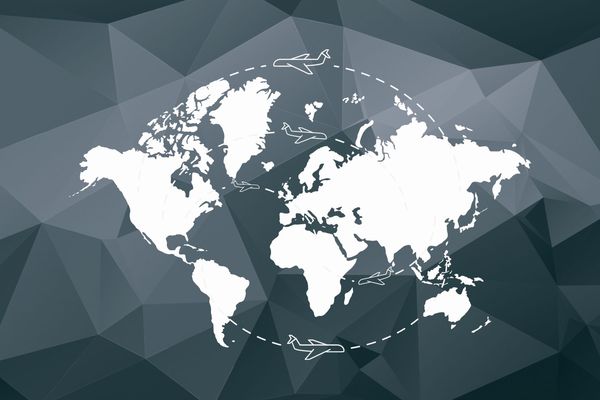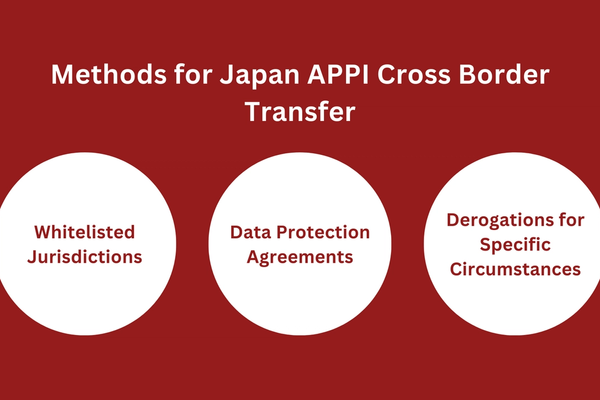
Ever wondered how to handle Japan APPI cross border transfer of data correctly? It’s a key challenge for many businesses. This article breaks down Japan’s APPI rules and their impact on moving data between countries.
We’ll guide you through the must-knows for compliance, the importance of data localization laws, and how recent updates to APPI affect your business. Whether you’re a big business or a small one stepping into global markets. This piece is your go-to for understanding data privacy in the context of Japan’s APPI.
Let’s start by ensuring your business is up to speed with these essential regulations.
Key Takeaways
Japan’s APPI law, especially its amended APPI provisions, is all about keeping personal data safe, particularly when it involves cross-border transfers. It’s like a rulebook for data privacy.
For sending data abroad, Japan, under its data localization laws, prefers using whitelists or special agreements to ensure other countries maintain the data’s safety.
These rules aren’t just for show; they help businesses earn trust by showing they care about keeping people’s information secure and private.
What is a Cross Border Transfer?
What is a Cross Border Transfer.jpg

Imagine you have a friend in another country, and you send them a letter. Now, think of that letter as personal data and the countries as different places with their own rules about keeping that data safe. That’s what we call a cross border transfer in the business world.
When people’s personal info moves between countries, it’s a big deal cause every place has its own laws on protecting folks’ details.
Like in Japan, they have this strict APPI law to guard personal information. Before sending personal data to another country, you must make sure they’ll protect it as well as Japan does. Sometimes, you might need to get permission from the person whose data you’re sending.
This is to make sure their information is safe and used in the right way.
Why does it matter to businesses? Well, when you’re careful with people’s private info, they trust you more. Following the rules also keeps you from getting in trouble. It isn’t just about moving data around; it’s about respecting privacy and being responsible.
So, cross border data transfer is a key part of doing business in our connected world. It’s all about moving data safely and legally across borders, keeping in mind the different rules each country has. For businesses, understanding and following these rules is super important. It helps you take good care of your customers’ data and build trust.
Overview of Japan’s APPI?
What is Japan’s APPI.jpg

Japan’s Act on the Protection of Personal Information (APPI) is a key law that businesses need to know about, emphasizing data localization to keep personal data safe.
This law protects all Japanese citizens from misuse of personal information. It sets standards for businesses to protect this personal information through reasonable means.
The APPI has been around for a while, but it some big updates came in April 2022. These changes made the rules even tighter, especially for sending data to other countries. Now, if a business wants to send personal data outside Japan, they have to make sure the other country will protect the data just as well as Japan does.
Sometimes, they even need to tell the person whose data it is about where and how it will be used. Who makes sure these rules are followed? That’s the job of the Personal Information Protection Commission (PPC) in Japan. They’re like the referees, making sure everyone plays fair with personal data.
What happens if a business doesn’t follow these rules? Well, it can get pretty serious. There can be fines and other penalties. If a business doesn’t follow Japan’s APPI law, it could face big fines of up to 100 million yes (around $700,000). Individuals might pay up to 1 million yen, around $7,000.
Businesses could pay even more. Besides fines, not following APPI can also hurt a business’s reputation and lead to other legal issues. Keep in mind, that these details are based on information up to early 2022 and could have changed since then.
It’s not just about the money, though. If a business doesn’t protect personal data, it can lose people’s trust. And in business, trust is everything.
So, the APPI is a big deal for anyone handling personal data in Japan. It’s all about respecting people’s privacy and keeping their information safe. For businesses, understanding and following the APPI is key to being responsible and trustworthy.
Methods for Japan APPI Cross Border Transfer
Methods for Japan APPI Cross Border Transfer.png

Dealing with cross-border data transfer under Japan’s APPI is tough for businesses. It’s key to know the methods and rules for compliance and data safety. We’ll explore how to transfer personal data from Japan abroad. We focus on whitelisted countries, data protection agreements, and needed exceptions.
Whitelisted Jurisdictions
Whitelisted Jurisdictions are countries or regions recognized by Japan’s Personal Information Protection Commission (PPC). They have data protection standards equal to or higher than required by the APPI. As of the latest updates, the European Union (EU) and the United Kingdom (UK) are on this list.
European Union (EU): The EU is on Japan’s whitelist because of its strong data protection laws under the GDPR. The GDPR’s strict rules for protecting data, individual rights, and duties of data handlers match well with Japan’s APPI. This makes data transfers between the EU and Japan smoother.
United Kingdom (UK): After Brexit, the UK kept data protection rules similar to the GDPR. This keeps the UK on Japan’s whitelist. So, personal data can move between Japan and the UK easily. Japan sees the UK’s data protection as good enough, needing no extra steps.
Data Protection Agreements
Data Protection Agreements are key for sending data to countries not on the whitelist. These agreements make sure the data receiver in these countries follows data protection rules similar to Japan’s.
Legal Binding Nature: These agreements are legal contracts binding both the data sender in Japan and the receiver abroad. They set out both sides’ duties, making sure data is highly protected.
Content and Scope: These agreements usually include details like why data is processed. They also include what data is moved, how long it’s processed, and people’s rights. They also have parts on keeping data safe, telling about data breaches, and who’s responsible for what.
Customization and Compliance: These agreements usually have a standard format. However, they can be tailored for specific data transfer cases. Businesses must make sure these agreements fully comply with APPI. They should accurately represent the real data processing activities.
Derogations for Specific Circumstances
Derogations are exceptions that permit the transfer of personal data under certain conditions, even if a whitelist or a data protection agreement does not cover the receiving country.
Explicit consent: A common derogation is getting clear prior consent from the person whose data is moved. This consent must be informed, specific, and given freely. It shows the person agrees to their data being sent internationally.
Performance of a Contract: Data transfers needed for a contract between the person and the data controller or for steps before a contract at the person’s request can also be an exception.
Public Interest and Legal Requirements: Transfers needed for public interest or legal claims are valid exceptions. This includes cases where the transfer is crucial to protect the vital interests of the person whose data is being transferred or others.
Judicious Use: It’s important for businesses to use these derogations judiciously. Each case must be individually assessed to ensure that the rights and freedoms of the data subjects are not compromised and the derogation is strictly necessary for the specific circumstance.
Why Does Japan Have Cross Border Transfer Rules?
Japan has special rules for when personal information goes to other countries. These rules are part of Japan’s law called the Act on the Protection of Personal Information (APPI). They are really important for keeping people’s information safe. Let’s talk about why these rules are there.
Keeping Personal Information Safe Everywhere
The main reason for these rules is to keep personal information safe, even when it goes to other countries.
Today, our information can travel all over the world very quickly. Japan’s rules make sure that when personal information leaves Japan, it is still protected well, just like it is in Japan. This helps people feel safe about how their information is used around the world.
Matching Up with Rules in Other Countries
Japan also wants its rules to be similar to rules in other countries, especially places like the European Union.
By having clear rules for sending data to other countries, Japan makes sure it’s doing things like many other places in the world. This is good because it makes it easier for businesses to work together and follow the same rules. It’s like playing a game where everyone knows and follows the same rules.
Making Sure Businesses Are Responsible
Lastly, Japan’s rules help make sure that businesses are responsible when they handle personal information. They have to be careful about who they share information with.
Also, make sure those people or other businesses also take good care of the information. This is important because it helps stop the wrong use of information and keeps everyone’s data safe.
These rules show that Japan takes protecting personal information very seriously, especially in a world where information moves across borders easily.
Closing
Navigating Japan’s APPI, particularly the amended APPI and cross-border data transfer rules, can be a complex task. If you’re handling data that crosses borders into or out of Japan, staying compliant is crucial.
That’s where we, Captain Compliance, come in. We specialize in making these complex regulations understandable and applicable to your specific business needs.
Our team, specializing in outsourced compliance, is here to guide you through every step, ensuring your data management practices are compliant and secure.
Ready to elevate your compliance in data privacy? Get in touch with us. We’re here to simplify and secure your data handling, keeping you aligned with the law and protecting your customers’ data.
FAQs
What Types of Data Transfers Require Compliance with Japan’s APPI?
Any transfer of personal data from Japan to another country must comply with Japan’s APPI, especially if the receiving country isn’t on the whitelist. This includes both digital and physical data transfers.
Need to understand if your data transfer falls under APPI compliance? Explore our detailed guides for clarity!
How Can Businesses Ensure Compliance with Japan APPI for Cross Border Data Transfer?
Businesses can follow the rules by sending data to approved countries, special agreements, or certain exceptions like getting explicit consent for transferring the Japanese citizens’ data. It’s important to know what each way needs.
Confused about compliance methods? Contact Captain Compliance for tailored advice on Japan APPI cross border transfer!
Can Small Businesses Be Exempt from Japan’s APPI Cross Border Transfer Regulations?
No, all businesses, regardless of size, must comply with Japan’s APPI when transferring personal data across borders if they handles data of Japanese citizens.
Learn what the recent Japan APPI amendments are and what they could mean for your business.
How Do Japan’s APPI Cross Border Transfer Rules Compare to Other International Data Protection Laws?
Japan’s APPI rules for sending data to other countries are a bit like other international data laws, like the GDPR. But they also have some differences. Understanding these nuances is crucial for businesses operating globally to ensure comprehensive compliance.